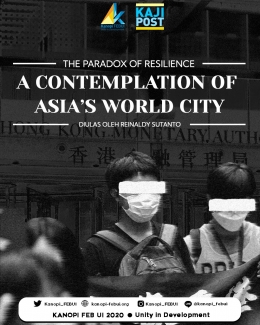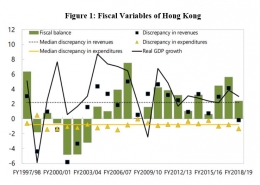Based on that research, it means that Hong Kong, which was a part of the East Asian miracle, has adopted the values for so long. In simple terms, the government of Hong Kong views its society as an Asian family structure, in which the primacy of family plays a crucial role. Combined with the aforementioned Lee's view, it can be put in another way that oppressions to protesters is a sort of stability that Hong Kong wanted to maintain. And it seems to be a success.
The lesson of such an experience could also be learned from China. In June 1989, the monumental Tiananmen massacre occurred, and hundreds to thousands of people were killed in this calamity, whose information regarding the whole story is fiercely banned in China. The interesting part is not about the massive reformation that emerged after it. But how could this alteration take place, particularly in China?
To answer that, first and foremost, the state of affairs should be understood. We have to know that, in addition to the pressure which incident put on China, it was also shocked by the collapse of Soviet and Eastern European communist regimes. The circumstance where it was overwhelmed by multi shocks later caused Chinese leadership to impose stricter control over society than ever before (Naughton, 2000).
At the same time as China became more socially stable caused by more repressive authority, Deng Xiaoping launched his vision of the "socialist market economy". In a while, this fulfilment of a big agenda invigorated market reforms, increased foreign trade and investment, and eventually shifted the economy into hyperdrive.
Without Waste of Words,
What happened in Hong Kong has brought to light the famous "Asian values". Social oppression, which is affiliated to the values, is used as an instrument to reinforce market economic reforms. That is to say, social stability is a precondition of economic growth. Although the practice isn't eternally accepted, one thing indeed becomes clear; There's still a place for our long-lasting spirit.
By: Reinaldy Sutanto | Ilmu Ekonomi 2019 | Staf Divisi Kajian Kanopi FEB UI 2020
References without Hyperlink
Barr, M. D. (2000). Lee Kuan Yew and the "Asian values" debate. Asian Studies Review, 24(3), 309-334.
International Monetary Fund Asia and Pacific Dept. (2019). People's Republic of China-Hong Kong Special Administrative Region : 2019 Article IV Consultation Discussions-Press Release; Staff Report; Staff Statement and Statement by the Executive Director for the People's Republic of China-Hong Kong Special Administrative Region. International Monetary Fund.
Liang, M. (2010). Confucianism and the East Asian Miracle. American Economic Journal: Macroeconomics, 2(3), 206-234. doi:10.2307/25760314








